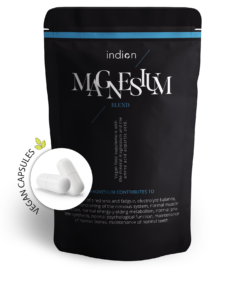You’ve most probably heard of magnesium, but what about magnesium supplements like magnesium glycinate?
This special form of magnesium – containing the magnesium mineral attached to the amino acid glycine is easy for the body to absorb and is especially beneficial for those who are deficient in this important mineral. Did you know that magnesium is one of the most important minerals in the body? It’s involved in hundreds of biochemical processes in the human body and is essential for good health. Research has found magnesium deficiencies to be present in a variety of conditions, including migraine headaches, asthma, attention deficit-hyperactivity disorder (ADHD), depression, anxiety, restless leg syndrome, cardiovascular disease, type II diabetes, and chronic fatigue syndrome. Magnesium glycinate benefits are sleep, mood, blood pressure, and more.
What is magnesium glycinate?
Magnesium glycinate is an important mineral that’s easily absorbed by the body. It’s made by combining magnesium with the amino acid glycine. Glycine is known as an “inhibitory neurotransmitter.” This means that it helps to calm the nervous system and promote relaxation. Magnesium glycinate is sometimes called “magnesium bisglycinate” or “magnesium diglycinate.” These are both forms of magnesium glycinate. Magnesium glycinate is available in powder, capsule, and tablet form. It’s also found in some multivitamins and mineral supplements.
How does magnesium glycinate work?
Magnesium supplements work by blocking calcium channels in nerve cells. This action helps to calm the nervous system. Magnesium also binds to GABA receptors. GABA is a neurotransmitter that’s responsible for relaxation and sleep.
It is easily absorbed by the body and has a high bioavailability. This means that magnesium glycinate supplementation is more likely to be used by the body than other forms of magnesium.
What are the benefits of magnesium glycinate?
There are many potential health benefits, including improved sleep, mood, blood pressure, and more.
Sleep
Dietary magnesium intake can help improve sleep quality by promoting relaxation and reducing stress levels. One study found that it was as effective as medication in improving sleep quality in people with insomnia.
Mood
It has also been shown to improve mood. One study found that magnesium supplementation improved symptoms of depression and anxiety in adults.
Blood pressure (Hypertension)
As an essential mineral it can also help to lower blood pressure. One study found that magnesium supplements reduce systolic blood pressure by an average of five points.
Blood sugar levels
It can also help to regulate blood sugar levels. One study found that magnesium supplements improve insulin sensitivity and fasting blood sugar levels in people with type II diabetes.
Reverse magnesium deficiency
It can also help to reverse magnesium deficiency. Magnesium deficiency is surprisingly common and can lead to symptoms like fatigue, muscle cramps, and migraines. It is often caused by a poor diet, certain medications, and chronic stress.
Anxiety or depression
It can also help to improve symptoms of anxiety or depression. A study found that magnesium supplementation improved symptoms of anxiety and depression in adults.
Headaches and migraines
It can also help to reduce the frequency and severity of migraine headaches. One study found that taking magnesium glycinate reduced the frequency of migraines by 41% in adults.
Insomnia
It can also help to improve sleep quality. One study found that it was as effective as medication in improving sleep quality in people with insomnia.
Type 2 diabetes
It can also help to improve blood sugar control in people with type II diabetes. A study found that it improved insulin sensitivity and fasting blood sugar levels in people with type II diabetes.
Osteoporosis / Bone Density
It can also help to improve bone health. One study found that it increased bone density and reduced the risk of osteoporosis.
Leg cramps
It can also help to relieve leg cramps. One study found that a Magnesium supplement reduced the frequency of leg cramps by 32% in adults.
PMS
It can also help to relieve symptoms of PMS. One study found that Magnesium glycinate supplements reduced the severity of PMS symptoms by 30% in women.
Boost memory and brain function
As an essential mineral it can also help to improve memory and cognitive function. One study found that taking magnesium glycinate improved memory and cognitive function in older adults.
Thyroid Function
It can also help to improve thyroid function. One study found that it improved symptoms of hypothyroidism in adults.
Cardiovascular Health
It can also help to improve cardiovascular health. One study found that it reduced blood pressure and improved heart function in people with hypertension.
Cancer Prevention
It can also help to reduce the risk of cancer. One study found that it reduced the risk of colon cancer by 50%.
How much magnesium glycinate should you take?
The recommended daily allowance (RDA) for magnesium is 400-420 mg for adults. However, many experts believe that the RDA is too low and that most people need more magnesium than what is currently recommended. The ideal dose depends on several factors including age, weight, and health status. For example, people with magnesium deficiency or those taking certain medications may need to take higher doses of magnesium glycinate.
Are there any risks or side effects associated with magnesium glycinate?
It is generally safe and well-tolerated. However, some people may experience side effects like diarrhea or nausea. It is also important to note that magnesium glycinate can interact with certain medications. Therefore, it is always best to speak with a healthcare professional before starting any supplement regimen.
Dosage: Should I take magnesium in the morning or at night?
Magnesium is vital for many processes in our body, and we must get enough. If you think your magnesium levels might be low there are several ways to explore including taking supplements or eating more food with added nutrients like calcium which helps supporting healthy bones by strengthening bones’selves against osteoporosis-causing fractures.
The recommended dosage of Magnegys depends on age/weight info as well any other medical conditions someone may have along with whether they’re already absorption deprived due to lack etcetera.
Although rare, high doses and too much magnesium may result in low blood pressure, irregular heartbeats, low breathing, and confusion. Hypermagnesemia is the name for a magnesium overdose, which is only possible if someone were to take in too much magnesium through food or supplements, and this is typically only a concern for those with heart or kidney problems.
There is no definitive answer to this question as everyone may have different needs. Some people find that taking magnesium in the morning helps to improve energy levels and brain function, while others find that taking magnesium at night helps to improve sleep quality. For our Magnesium Blend we recommend taking 1 capsule 30 minutes before going to bed. Magnesium glycinate daily helped a lot of people to improve their sleep quality.
Is it safe to take magnesium glycinate daily?
Having sufficient magnesium levels in the body is essential. Magnesium plays many vital roles in your body. A well-balanced diet, including magnesium-rich foods, can help to ensure that you are getting enough magnesium. Excess magnesium In general, excessive magnesium levels aren’t typical in healthy people because the kidneys usually eliminate the excess. A suboptimal magnesium status might, however, be common in the United States. While magnesium glycinate is generally considered safe, there are a few potential side effects to be And yes, magnesium supplements like magnesium glycinate are safe to take daily.
What is Magnesium Bisglycinate?
Magnesium Bisglycinate is a chelated form of magnesium (magnesium salt). Two molecules of the amino acid L-Glycine are bound to one magnesium molecule. Magnesium Bisglycinate is a highly bioavailable source of magnesium and combines the benefits of both binding molecules. It is a well tolerated and highly functional form of magnesium. Magnesium Bisglycinate is the best choice for those with poor gut health or who are sensitive to other forms of magnesium. It is also ideal for people who have trouble sleeping as it has a calming effect on the nervous system.
Magnesium Deficiency
A magnesium deficiency can lead to a number of health problems including anxiety, insomnia, migraines, and muscle cramps.
Magnesium glycinate is a great way to improve your magnesium levels and address any deficiencies you may have. This supplement is safe to take daily and has a variety of benefits for your health.
Magnesium Glycinate vs. Citrate
Can you take magnesium citrate and glycinate together? Magnesium citrate is a more popular form of magnesium, but magnesium glycinate is actually more bioavailable and easier for your body to absorb. Magnesium glycinate is also less likely to cause GI issues like diarrhea or nausea. Magnesium citrate may be a better choice if you are looking for a magnesium supplement to improve bowel function.
Magnesium Oxide Vs. Magnesium Citrate
Magnesium oxide is the most common form of magnesium, but it is not very bioavailable. This means that your body cannot easily absorb and use it. Magnesium citrate is a more expensive form of magnesium, but it is better absorbed by your body. Magnesium oxide is more likely to cause GI issues like diarrhea or nausea. Magnesium citrate may be a better choice if you are looking for a magnesium supplement to improve overall health.
Glycine in Nervous System Function and Mood
Glycine is an inhibitory neurotransmitter in the central nervous system (CNS). Glycinate has been shown to support relaxation and a healthy sleep cycle by binding to glycine receptors in the brain.
Glycinate also plays a role in supporting healthy cognitive function and mood. One study found that magnesium glycinate improved symptoms of anxiety and depression in adults.
How to Maximize the health benefits
It is important to take the supplement regularly. This will help to ensure that your body has adequate levels of magnesium. It is also important to speak with a healthcare professional before starting any supplement regimen. They can help you determine the best dose for your individual needs.
Final Thoughts Magnesium glycinate
Taking magnesium glycinate is a great way to improve your overall health and well-being. Taking magnesium supplements is safe to take daily and has a variety of benefits for your health. Glycinate can help to improve sleep quality, cognitive function, and cardiovascular health. It can also help to reduce the risk of cancer. To maximize the benefits of magnesium glycinate, it is important to take the supplement regularly and speak with a healthcare professional about the best dose for your individual needs.
Are you interested in trying magnesium glycinate? We offer our Magnesium Blend Supplement in capsule form! Check it out now!
Nutritional supplements
€39,90






